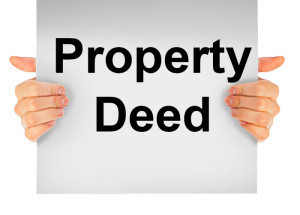What is a Property Deed?
[vc_row][vc_column][vc_column_text]
Propert Deed
A deed is a legal instrument that transfers some property right in real estate. Deeds in their most basic form contain:
- A description of the real estate involved
- The names of the respective parties
- The signature of the person transferring the real estate
What are the basic types of property deeds?
Here are the most common types of property deeds and how they are typically used:
- Warranty deed: a warranty deed transfers ownership and provides additional promises, including that the transferring party has good title (in other words, the property is free of liens and claims of ownership). If the promises made turn out to be untrue, the transferring party agrees to compensate the buyer.
- Grant deed: a grant deed transfers ownership and traditionally promises that the property hasn’t already been transferred to someone else.
- Quitclaim deed: a quitclaim deed transfers whatever ownership rights that the transferring party may have on the property. Quitclaim deeds are useful for transferring rights when it’s unclear exactly what those rights are.
I’m buying real estate jointly with someone, are there different ways to do this?
There are generally three ways to take property jointly with someone, and the effect of the choice can be significant. In whichever form of deed you use, you should specify how the property is being taken. Here are the three most common:
- Tenants in common: if you take property as tenants in common, you can take unequal shares of the property and you can define who your property interest goes to when you die.
- Joint tenants: if you take property as joint tenants, you must take the property in equal shares, and your share will automatically pass to the other co-owners upon your death. Because the share automatically passes, you do not need to dispose of this property right in your will.
- Tenants by the entirety: tenants by the entirety is also referred to as community property. Tenants by the entirety is a form of spousal property, where each spouse owns the whole property and cannot transfer his or her right to the whole property without the consent of the other tenant.
Do property deeds need to be notarized, filed and witnessed?
Almost all states require that a deed be notarized and filed, and some states require that it also be witnessed. First, the transferring party should go to a notary, who will notarize and witness the signature. Next, the transferring party should record the deed by filing it with the land records office in the county where the property is located (also commonly called a country recorder, land registry or register of deeds). The office will keep a copy and return the original to the transferring party.
What are trust deeds and contracts for deeds?
There are two common “deeds” that aren’t really deeds at all because they don’t transfer property:
- Trust deed: a trust deed (or deed of trust) is really a mortgage that transfers title to land to a trustee who holds the land as security for a loan. When the loan is paid off, the title is transferred back to the borrower.
- Contract for deed: a contract for deed is really a contract and grants one party title to property until the other party pays off his or her loans, upon which title is transferred back to the original borrower.
Different Types of Deeds
Warranty Deed
Often used for residential real estate sales, a Warranty Deed acts as a guarantee to the buyer that the seller has the right to sell the property, and that the property is free of debt or other liens. The seller must defend the title against any and all other claims, and compensate the buyer for any unsettled debts or problems.
Special Warranty Deed
Differing from a Warranty Deed, the seller’s guarantee does not cover the property’s entire history. Generally, the seller only guarantees against problems or claims created during the seller’s ownership of the property. A Special Warranty Deed is often used in commercial property transactions or residential real estate sales.
Quit Claim Deed
Most often used by family members, divorcing spouses, and people well-acquainted with each other, a Quit Claim Deed allows one party to transfer property rights and claims to another party. Usually there is no monetary exchange. The extent and authority of the grantor’s interest or claim to the property is unspecified, and the grantee is not provided with a guarantee.
Bargain and Sale Deed
Typically used in residential real estate sales or sales of court-seized properties, theBargain and Sale Deed transfers ownership of a property from the seller to the buyer. It generally does not guarantee to the buyer that the seller owns the property free and clear. A Bargain and Sale Deed resembles a Quit Claim Deed, but the property is sold rather than relinquished.
Grant Deed
A Grant Deed transfers interest in a property from the seller to the buyer in exchange for an agreed-upon price. While the Grant Deed guarantees that the seller owns the property and is legally able to sell it free of debt, it does not provide a guarantee against defects of title (unlike the Special and General Warranty Deed). This type of deed is commonly used for residential real estate sales.
[/vc_column_text][vc_video link=”https://www.youtube.com/watch?v=TApjQ2ixHv8″][/vc_column][/vc_row]
Local Records Office | Property Profile Report Deed










